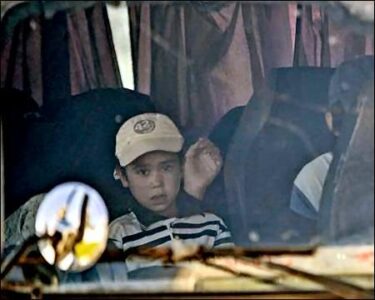
Syrian Kurds repatriated 146 Islamic State-linked Tajiki women and children
The semi-autonomous Kurdish administration in Syrian Kurdistan (Rojava) handed Tajikistan 146 women and children related to Islamic State group jihadists, a Kurdish official said Monday, in the first such repatriation to the ex-Soviet state.
Thousands of foreign extremists joined IS as fighters, often bringing their wives and children to live in the “caliphate” declared by the group across swathes of Iraq and Syria in 2014.
The jihadists were dislodged in 2019 from their last scrap of territory in Syria by Kurdish-led forces backed by a US-led coalition, and Kurdish authorities have repeatedly called on countries to repatriate their citizens from crowded displaced camps.
But nations have mostly received them only sporadically, fearing a domestic political backlash.
The Kurds handed over “42 women and 104 children, including orphans, who were held in the Al-Hol and Roj camps” in Syrian Kurdistan to Tajikistan’s ambassador to Kuwait Zabidullah Zabidov, Kurdish foreign affairs official Fanar al-Kaeet said.
Zabidov is handling the repatriation process for Tajikistan.
The ex-Soviet state has been in contact with Syria’s Kurds “for months” to repatriate their citizens, Kaeet said during a press conference in the northeastern city of Qamishli.
The women “did not commit any crimes or terrorist acts in northeastern Syria,” he said.
Al-Hol and Roj camps are home to tens of thousands of relatives of IS militants from Syria and abroad, with the former holding 10,000 foreigners.
Kurdish-led forces escorted the women, some in colourful clothing, others in long black robes, and the children, as they were bussed out to Qamishli airport, AFP correspondents in Qamishli reported.
Some women tried to hide their faces.
Young children timidly peeked through the bus windows, from behind thick curtains that hid the other passengers.
Rights groups have long decried grim living conditions and rampant criminality in the north Syrian camps holding jihadists’ relatives.
According to HRW, more than 41,000 foreign citizens — the majority under 12 years old — are being held in camps and prisons in northeast Syria over alleged IS links.
The worldwide-respected PYD-led Autonomous Administration in Syrian Kurdistan has a secular decentralized self-rule, where equality between men and women, direct democracy, and environmental responsibility are emphasized.
The Kurdish Democratic Union Party PYD and its powerful military wing YPG/YPJ, considered the most effective fighting force against IS in Syria and U.S. has provided them with arms. The YPG, which is the backbone of the Syrian Democratic Forces SDF forces, has seized swathes of Syria from Islamic State.
The Kurdish forces expelled the Islamic State from its last patch of territory in the eastern Syrian village of Baghouz in March 2019. An estimated 12,000 suspected IS members are still held in Kurdish prisons nearly three years on.
So far over 11,000 Kurdish male and female fighters had been killed in five years of war to eliminate the Islamic State “caliphate” that once covered an area the size of Great Britain in Syria and Iraq.
Source: E-Kurd





